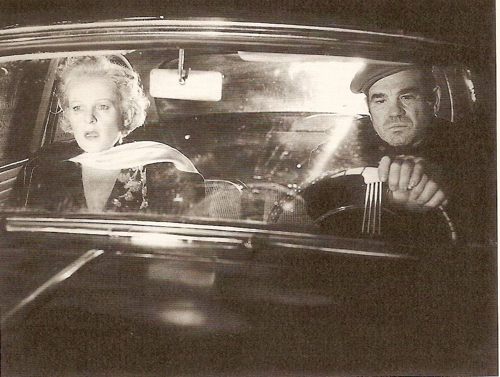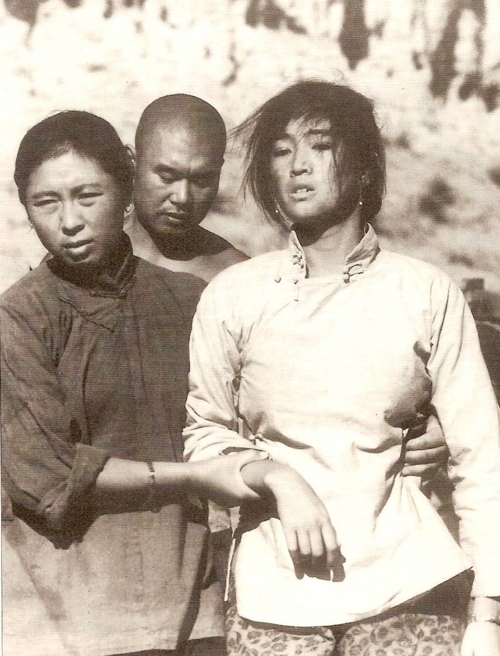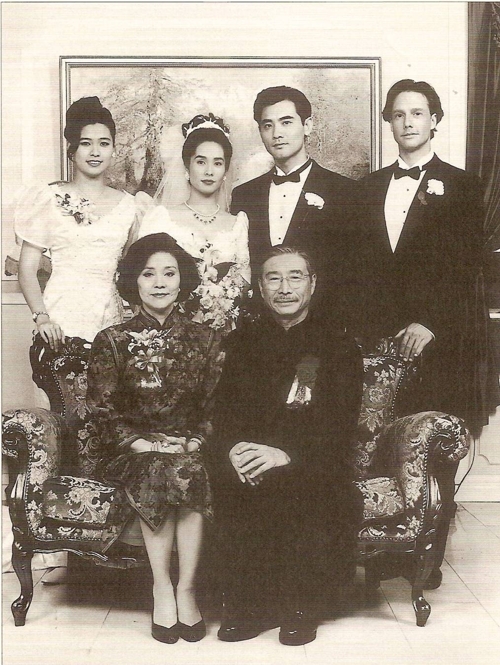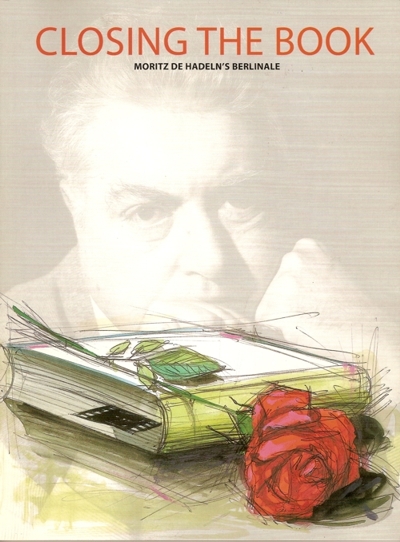
The "Magnolien" book, subtitled "SpecialThanksedition" was a surprise gift from colleagues and friends to Moritz and Erika de Hadeln upon leaving the 2001 Berlinale It contains many remarkable film memories of unique moments between 1979 and 2000, among others texts from Fernando Lara - recalling the night in 1981 when Moritz de Hadeln declared his solidarity with the Spanish delegation during the Coup d'Etat in Madrid, by Hans Helmut Prinzler on Fasbinder's "Die Sehnsucht der Veronika Voss" (1982), the only Gold Award Fassbinder ever received during his lifetime, from Ula Stöckl on the selection of "Heller Wahn", from Mike Downey on John Cassavetes "Love Streams", from Margarete von Schwarzkopf on the tortuous selection process of David Hares "Wetherby", from Joachim von Vietinghoff on "Steel Magnolias" and the first festival in both parts of the town in1990, from Hans-Joachim Schlegel on Aleksandr Askoldvs "Komissar" and Kira Muratova's "Asteniceskij Sindrom", from Hans-Goerg Sawatzki on the presentation of Wim Wenders "Million Dollar Hotel", from Silke Schütze on the enthusiastic reception of Paul Thomas Anderson "Magnolia" to which the jury chaired by Gong Li awarded the Golden Bear (2000) and from Wolfgang Jacobsen, author of the Berlinale history, a reflection on the extremes between Fritz Lang "Metropolis" and Stanley Kubrick "2001" somehow part of the Berlinale reality.
All the films mentioned made history during the "de Hadeln era". Unfortunately this book was never made public. Following are some of the more personal quotes:
Introduction "Danke. Thanks. Merci."
"Eine Ära geht zu Ende. Moritz de Hadeln verabschiedet sich als Direktor der Internationalen Filmfestspiele Berlin. Seit 1980 formte er das Gesicht des Festivals und machte es zu einem Kulturereignis von internationaler Bedeutung. Er hatte den Blick für das Neue ebenso wie das Interesse, im Rückblick die Filmgeschichte mit der Gegenwart in Beziehung zu setzen [...]".
"Mit Moritz de Hadeln hat seine Frau Erika das Festival in den letzten zwanzig Jahren geformt. Sie hat der wuchernden Berlinale organisatorische Struktur gegeben, im Protokoll das Terrain fur die internationalen Gäste bereitet. Ihre Stimme im Kreis des beratenden Auswahlgremiums hatte Gewicht. In vielen Diskussionen, die sich im Kreise zu drehen begannen, in denen sich Argumente verhakten, hat sie einen Ausweg gefunden, die Balance zwischen konträren Ansichten respektierend, aber mit dem Geschick, unauffällig einen Weg ins Freie zu weisen."
That same year (2001) the festival published "Closing The Book, Moritz de Hadeln's Berlinale (1979-2001)", with texts largely cured by the film critic Volker Baer. This book was published on the suggestion of Prof.Dr.Ulrich Eckhardt then head of the Festispiele GmbH, and given to all the guests attending the festival.
Magnolien

Michel Ciment "A la Hemingway"
"A l'heure ou l'Europe se construit patiemment Moritz de Hadeln résume en lui toutes les vertus du cosmopolitisme. Polyglotte... il est ouvert a toutes les cultures. Mais ses connaissances ne sont pas que livresques tout comme sa decouverte des films ne se limite pas a sa salle de projection de Berlin. Comme ces grands chasseurs de gibier à la Hemingway il parcourt Ie monde à la recherche de l'oiseau rare ou de la baleine blanche d'Asie, en Amerique et bien sur aux quatre coins de l'Europe. Sa curiosité, sa capacité a créer des liens, son goût de la découverte ont fait du festival de Berlin une des plaques tournantes du septième art."
Christel Buschmann "Little Poem for a Big Man"
"Moritz, Maurice, es ist soweit,
"Schön war die Zeit, schön war die Zeit.
Du liebst das Kino vehement,
Du stützt den Film, den keiner kennt,
Du diskutierst mit Witz und Wissen,
Du planst und programmierst gerissen,
Du kennst die Branche, das Geschacher,
Du kennst das Los der Filmemacher,
Du kennst die Filme dieser Welt,
Du kennst den Kampf Kunst gegen Geld. [...]"
Al Newman "Life with Moritz"
"No single word better describes my affection for or relationship with my dear friend and colleague Moritz de Hadeln. I believe it reflects the way the international film industry feels about this Berlin Bear of an individual who has left his indelible mark on the world-class festival to which he has dedicated the past 22 years of his professional life. And I believe it succinctly sums up the way all of us who have been associated with him lovingly feel about our "Life with Moritz."
Stephen Locke "Berlin Goes Red"
About Zhang Yimou's "Red Sorghum" (1987): "It is more than good fortune that the film ended up in Berlin and that Moritz de Hadeln had the foresight to accept it for competition. It led the way for the subsequent triumph of Chinese cinema at all of the world's major film festivals. And it all began in Berlin."
Norman Wang "In Search of Hidden Treasures"
"Since I knew a Taiwanese American shooting a film about a gay couple in New York, I told Moritz and asked if he wanted me to follow up on this film.[...] Eventually, in December 1992, a screening was set up. [...] I immediately phoned Moritz and told him my reaction. [...] This film was "Hsi Yen/The Wedding Banquet" by Ang Lee and went on to share the Golden Bear at the 1993 festival. This was another golden moment in the renaissance of Chinese cinema. Under Moritz and Erika de Hadeln, Berlin has championed many international talents. In their work since the late 1980s, they have helped to spread the renaissance of Chinese cinema and foster an environment in which these works can be understood. They will be missed by the members of the Asian film communities."
Lissy Bellaiche " A Hans Christian
Andersen Fairytale"
"For more than 20 years Moritz de Hadeln has directed the Berlin International Film Festival. I started as International Manager of the Danish Film Institute in March 1980, so my first Berlin Film Festival was in February 1981. In other words, I have known Moritz for almost the entire time he has been in Berlin. I must say that he has managed to make the Berlinale one of the most important festivals in the world, especially during the years when Germany was divided into East and West, but certainly last year as well. Moving the whole festival to Potsdamer Platz was not an easy job, but he did it with great success. For Scandinavian films and especially for Danish films, the Berlin festival and the market have been the best places to present our films."
After recalling memories of the presentation in Berlin of Lone Scherfig "The Birthday Party", of Soren Kragh-Jacobsen "Mifune"(1999) and how Iben Hjejle was selected to play in a Stephen Frears film late night at a hotel bar during the festival, Lissy concludes: "And of course all of this is thanks to Moritz de Hadeln"




Die Sehnsucht der Veronika Voss (1982)
Gong Li in Red Sorghum (1987)
The Wedding Banquet (1993)
Volker Schlöndorff "Merci Moritz"
"Ich greife ein Thema auf, das gerne vermieden wird und doch viele Spekulationen in Produzentenkreisen anheizt: der deutsche Film auf der Berlinale.[...] Nur junge Regisseure, am besten mit einem Erstlingsfilm, hatten eine Chance entdeckt zu werden, so wie es kürzlich Andreas Dresen mit "Nachtgestalten" glückte, endlich wahrgenommen zu werden. Ich kenne die Statistiken nicht, aber immerhin haben "Stammheim" und "Veronika Voss" Goldene Bären errungen, worüber RWF sich damals riesig gefreut hat.[...]Ähnliches soIl auch in Cannes gelten, weswegen viele französische Regisseure wie Louis Malle, Claude Chabrol und Bertrand Tavernier sich immer gehütet haben, dort zur Schlachtbank zu gehen [...] Und doch sind Heimspiele einfach wichtig. Wo sonst als in Berlin hätte zum Beispiel ein Film wie "Deutschland im Herbst" sein Forum finden können? Nachdem weder das Fernsehen noch sonst jemand damals dieses heisse Eisen aufassen wollte [...] warst Du es, Moritz, der den Film nach Berlin eingeladen hat.[...] Als Festivalleiter hast Du immer wieder deutsche Filme eingeladen, die etwas über Deutschland aussagen. Als Ausländer hattest Du dafür einen geschärften Blick und es hat Dir auch nicht an Sprachkenntnis gefehlt, um die feinen Zwischentöne und das, was zwischen den Zeilen verschwiegen wurde, herauszuhören."









